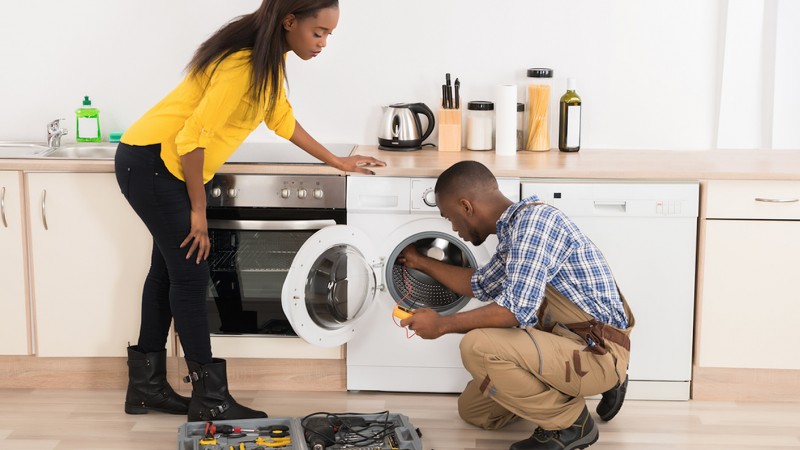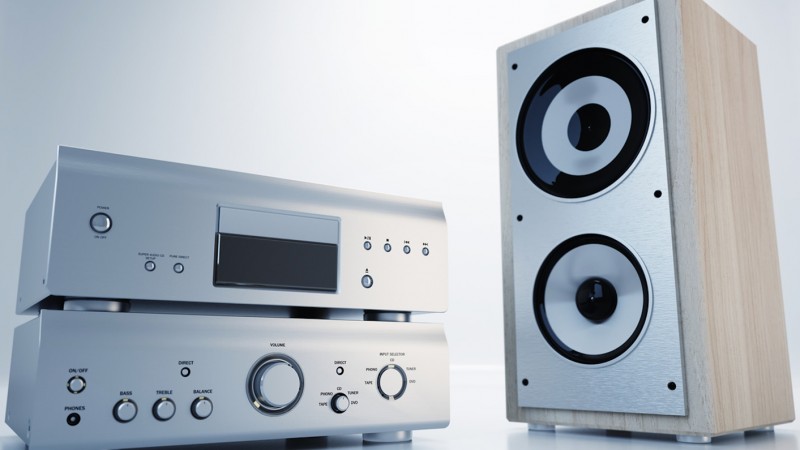Appliance Repair Guide
- Details
- Written by The FoolProof Team
- Category: Articles

All those household appliances that are supposed to make our lives easier, sometimes don't. When repairs may be looming or better yet before they rear their heads—this guide can help.
Appliances - Repair or Replace?
When the stove, refrigerator, washing machine or other household appliance stops working, how do you know whether it's time to call a repair service or to replace the appliance? The following tips can help you make a sound decision.
-
Troubleshoot the problem first. The appliance may be unplugged, have tripped a safety switch or circuit breaker, or have some other simple problem that's easily put right. Every appliance comes with an owner's manual, most of which have troubleshooting sections. Consult these first.
If you don't have the appliance's owner's manual, you may be able to find the manual or troubleshooting assistance for the specific appliance on the Internet. Check the manufacturer's web site first.
-
Make notes of your answers to the troubleshooting questions. Also note the age of the machine and whether or not it is still under warranty. These notes can help you decide whether repair or replacement makes more economic sense as you work through the questions in the next step.
-
Use the following two checklists to help weigh the reasons for repair or replacement. Answering some of the following questions requires that you do some homework on features and prices of potential replacements. Appliance manufacturers' and retailers' websites and sites that offer reviews, such as that of Consumer Reports, provide useful information quickly.
Because many appliances cost from nearly $1,000 to many thousands, spending $75-$100 on a service call to get an accurate estimate of repair costs may make economic sense. Often, if you decide to repair the appliance, the service call fee is credited toward the total repair cost.
Reasons to Repair
The appliance is still under warranty and the problem is covered.
Based on average life expectancy, the appliance still has enough service years in it to justify the repair. The following table, which is based on data from several consumer and manufacturer sources, notes typical longevity for average (not high end) models of various appliances:
Refrigerator 9-13 Freezer 10-20 Range 13-17 Dishwasher 9 Washer 5-15 Clothes Dryer 13 Room Air Conditioner 5-7 Repair costs are reasonable. One rule of thumb identifies "reasonable" as "less than 50% of the cost of a new appliance."
How much will it cost to remove the existing appliance, install the new appliance, and dispose of the old appliance? These costs may add up and make the savings with a new appliance disappear.
Is it difficult to remove the appliance from the house? Having to tear out the appliance or breakdown the appliance or make changes to the house to get the old appliance through a doorway, for example, might influence your decision.
Has the current appliance given good service and do you particularly like the model? Simply not wanting to change can be a valid reason for repair.
Reasons to Replace
The repairs will cost more than 50% of the cost of a new appliance.
The new model is more energy efficient. Compare the annual energy savings of the new model to the cost of running the old model. Energy efficiency savings may help the new appliance pay for itself over several years.
Does the new model have newer technology that you would like?
Will a new model provide additional features that are desirable or provide additional convenience and flexibility? Will you use these features?
Replacement parts may be hard to find. The older the appliance, the harder it is to find the parts. It is even hard to find parts for some newer models.
Replacement parts are expensive. Consider what the part is costing in comparison with the age of the machine. For example, if you replace a major part in a 7-year-old appliance, remember that all the other parts are still 7 years old.
Do you simply want a new appliance? If so, can you afford to purchase the appliance without wrecking the budget or going into too much debt (particularly high credit card or retail contract debt)?
Selecting a Repair Service for Your Home Appliances
Repairing an ailing appliance may make economic sense, but finding a reliable repair service is a perennial problem for consumers. The following Q&A provides information to help you locate a reputable repair technician.
What Kind of Repair Service Are you Considering?
What type is right for your appliance?
There are 3 types of repair services: factory, authorized, and independent.
Factory service is performed by technicians who work for the manufacturer.
Authorized service is performed by independent technicians who are authorized by the manufacturer to service their products. These technicians have usually been trained by the manufacturer. They tend to use test equipment and replacement parts from the manufacturer. They may also need to meet certain standards.
Independent service is performed by independent technicians that have no connection or contract with appliance manufacturers. Independent technicians may be able to service your appliance but they aren't authorized by the manufacturer and probably haven't received the manufacturer's training.
Is the appliance under the manufacturer's warranty?
If the appliance is still under the manufacturer's warranty, you should use the factory or an authorized service. Not doing so can void the warranty. To find an authorized service, use the book that came with your appliance. If you can't find your book, call the company or check the company's website. Don't rely solely on the advertisements online or in the phone book because businesses can just list the brands they work on and imply that they are an authorized service. If the ad says "authorized service," ask specifically when you call about your brand.
Working with a factory technician may also be beneficial if you end up replacing the appliance after a service call. Many manufacturers will give you a credit toward a new appliance (of the same brand of course) of at least the amount of the authorized service call.
Is the appliance under an extended warranty or service contract?
If so, then like the manufacturer's warranty, you must follow the instructions related to what repair companies may work on the appliance.
Is the service technician qualified to service the appliance?
What training and credentials does the service technician have? Certifications from the Professional Services Association (PSA), the International Society of Certified Electronics Technicians (ISCET) or National Appliance Service Technician Certification Program (NASTeC) indicate that the technician has met industry standards for training and performance.
Does the repair service have a record of consumer complaint or satisfaction?
Check out the company (or the technician if independent) with the Better Business Bureau (or your local/state equivalent) or other consumer affairs office.
Is the problem simple enough to repair yourself?
Finally, consider repairing the appliance yourself. Up to 75% of the cost of repairing an item is related to labor. Some tasks—such as changing a heating element on an electric cooktop/range or changing the hoses on a clothes washer—are usually very simple. There are numerous sites on the Internet that can provide do-it-yourself instructions. Start with the manufacturer's web site. Many of these provide information on repairs and ordering parts. Additional helpful web sites include:
Even if you decide the repair is beyond your skill or courage, educating yourself about the appliance will make you a more informed consumer who's better able to work with the repair technician for a successful repair.
Extended Warranty or Service Contract
Can an extended warranty or service contract on new appliances or computers be a good value?
A consumer purchasing a new dishwasher or refrigerator these days—or a new piece of computer or electronic equipment—can't get out of the store without being asked to buy an extended warranty. Or the store may call these warranties an "extended service plan" or "service contract." By any name, these plans offer to give you "peace of mind" against future repairs for a set number of months or years for a set price. The impending expiration date of the manufacturer's original warranty brings another flurry of phone and mail offers. Can such plans be a good value?
If you want to save money on repairs, most consumer advocates say that extended warranties or service contracts are generally a way to waste money rather than save it. Should you be interested in an extended warranty/service contract for other reasons, make sure you check out the offer thoroughly. Be sure to read the contract carefully, including fine print, before signing. Getting answers to the following questions can help you make a sound decision.
What exactly does the extended warranty cover? And what doesn't it cover?
Extended warranties are a form of repair coverage. Don't assume that an extended warranty will pay for everything. For example, you may have to pay for labor, parts, or shipping. Most plans have limits and exclusions—repairs, services or costs they won't pay for. The plan also may or may not cover regular maintenance.
When does the extended warranty begin?
Does it pick up when the manufacturer's warranty ends or does it run concurrently? If it runs concurrently, what does it cover that the manufacturer's warranty doesn't? You don't want it to duplicate the manufacturer's warranty.
How long does the plan run?
If you are buying an appliance that can be expected to give 8 or 10 years of good service, and your plan runs for just 3 years, what about those remaining years? Ask if the plan is renewable and what the renewal will cost. Note that the cost of an extended warranty/service contract tends to rise dramatically the older the appliance gets.
Is the contract being offered by the store, the manufacturer, or a third party?
Does it remain valid if you move? Can you transfer it to a new owner? Is the contract backed by a reputable manufacturer or company? If the seller goes out of business, will your contract then be worthless?
Where will the appliance or equipment be serviced?
Do you have to bring it in for service, send it somewhere for service, or can it be serviced in the home? Are you prepared to have to ship that computer away, for instance, when there may be excellent repair services in your city?
What occurrences or actions void the contract?
For example, if you drop that laptop or the flood in your basement shorts out the washer, are you covered or does your "negligence" make the contract void?
What is the cost of an out-of-warranty repair?
Most people don't know exactly what's wrong with equipment when it needs repair. If the problem is not covered by the warranty, what does the company charge for those repairs? Sometimes the out-of-warranty terms are very high.
What is the repair record of the product?
If the product has a history of needing repairs, then you may wish to consider purchasing a product with a better repair record even if it costs a little more, rather than spend the money on an extended warranty.
Will you remember you have it?
No more than 20% of extended warranties are ever used. That's why retailers are so eager to sell them—they are a great profit center.
Does the contract have automatic renewal?
Reject this option if possible. If you can't say no to automatic renewal, don't sign up for that particular plan. Don't assume that if you don't pay, the contract will be canceled. Some companies treat renewals like purchases, and if the bill isn't paid on time, penalties accrue until the bill is paid. The cancellation process should be specified in the contract. Always cancel the contract in writing and address your letter to the person and address specified in the contract.
Our Recommendation: Rather than let the warranty company earn interest on your money—for repair services there's an 80% chance won't be used—set aside a similar amount in a savings account where it earns interest for you.


































